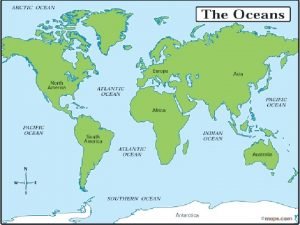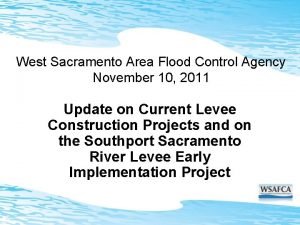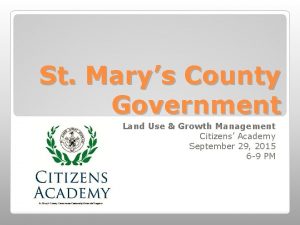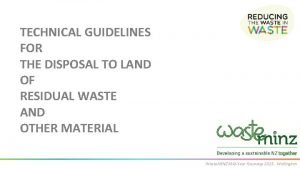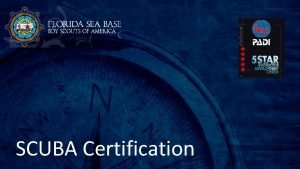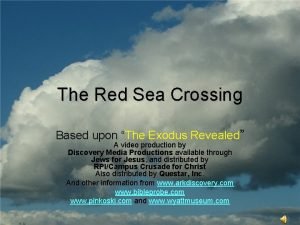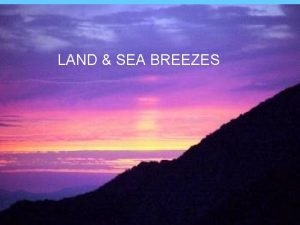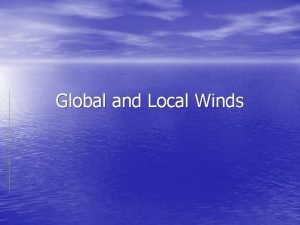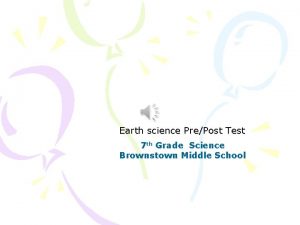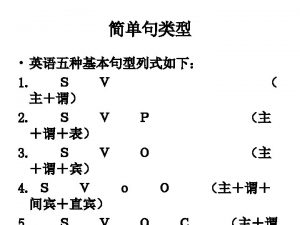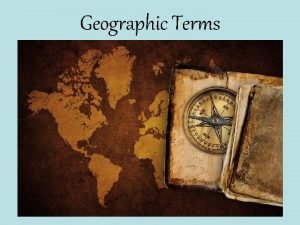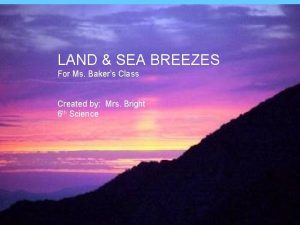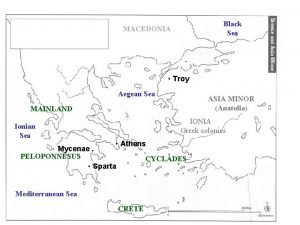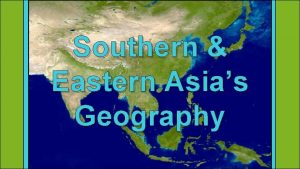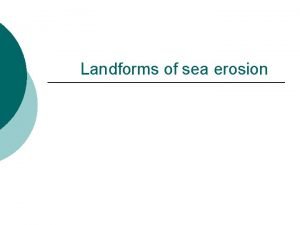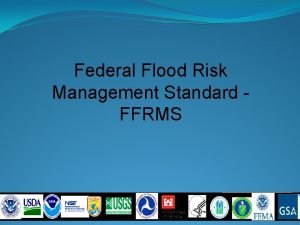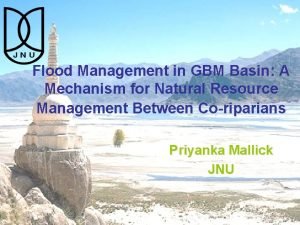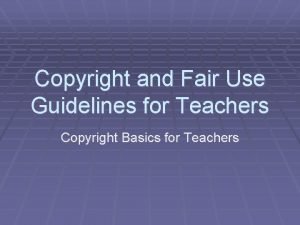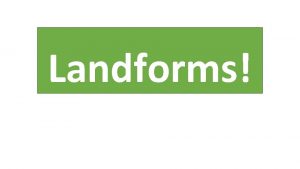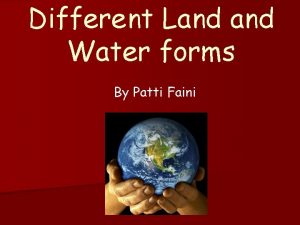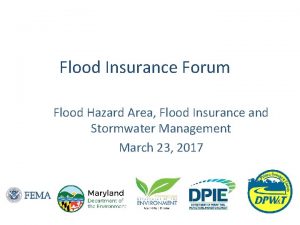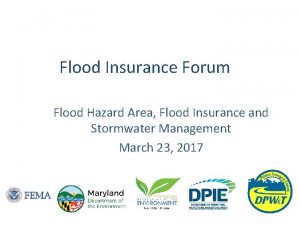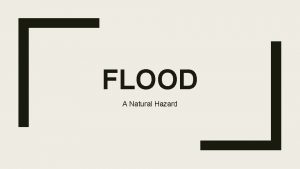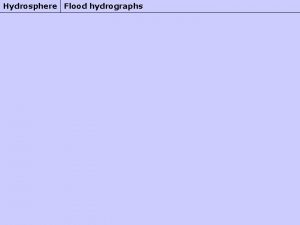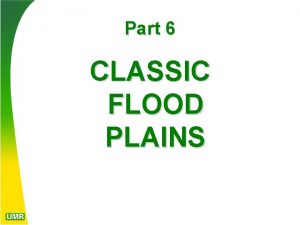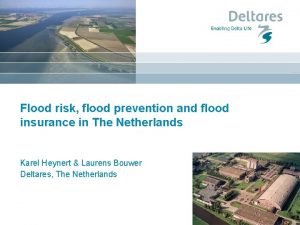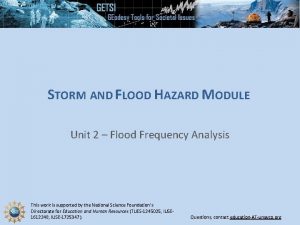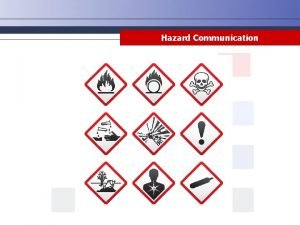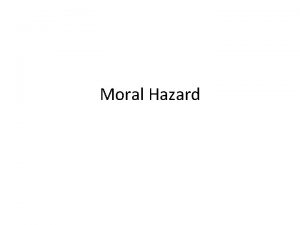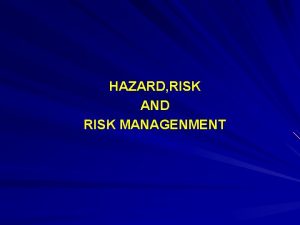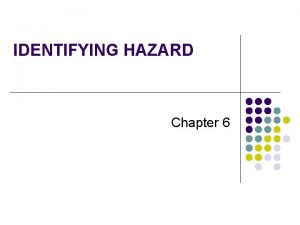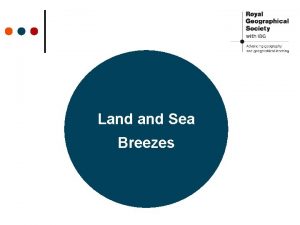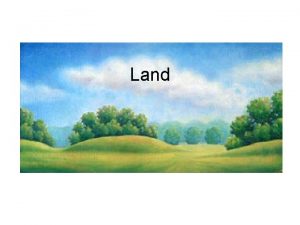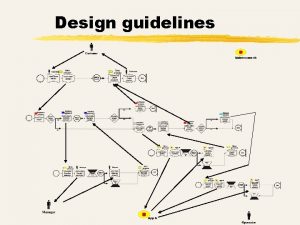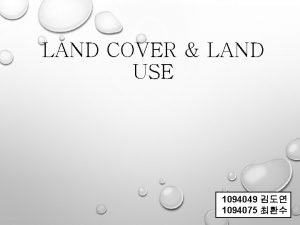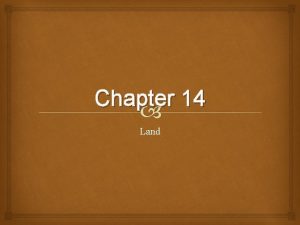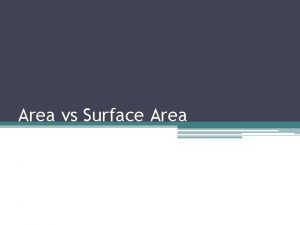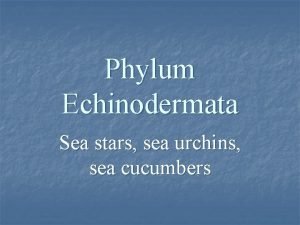Flood Hazard Area Land Use Management Guidelines Sea




























- Slides: 28

Flood Hazard Area Land Use Management Guidelines Sea Level Rise Amendment Effective January 1, 2018

What are the Flood Hazard Area Land Use Guidelines used for again?

Flood Hazard Area Land Use Management Guidelines • Provincial guidelines intended to minimize injury and property damage resulting from floods • Intended to support land use and development decisions broadly • Recommend setbacks and flood construction level (FCL) for various hazard types • Local Government Act – Local governments “must consider” guidelines when making bylaws for designated sea level rise (SLR) planning areas • Linked to Compensation and Disaster Financial Assistance Regulation for determining “properly flood protected” properties in designated SLR areas Updated by the Ministry of Forests, Lands, Natural Resource Operations and Rural Development – January 2018

Amendment to Sections 3. 5 and 3. 6 • The provincial guidelines have been amended to define SLR planning areas and to incorporate sea level rise into the determination of building setbacks and flood construction • The amendment affects communities where potential flood levels will be increased by sea level rise • The amendment comes into effect on January 1, 2018 • In the absence of more site-specific studies of information by a qualified Professional Engineer, the Flood Hazard Area Land Use Management Guidelines are the recommended provincial minimum requirements for land use management in flood hazard areas

Flood Hazard Assessments • The management of land use in coastal flood hazards may require flood hazard assessments to be completed by a suitably qualified Professional Engineer, experienced in coastal engineering. The standards of practice that these Professionals should follow include those outlined in the most recent revision of the “Professional Practice Guidelines – Legislated Flood Assessments in a Changing Climate in BC”, published by Engineers and Geoscientists of BC. • The Professional Practice Guidelines provide for use of risk based assessment methodologies not considered by this Amendment. Those choosing to base approval decisions on risk assessments prepared by Professional Engineers, must ensure the changes in risk over time due to sea level rise are fully taken into account.

How did this amendment come about?

Timeline of Milestones

What type of engagement and consultation took place?

Engagement and Consultation Review, discussion, and input was sought and incorporated into the amendment, including from the following agencies: • • Fisheries & Oceans Canada Natural Resources Canada Multiple Provincial Ministries Experts from the University of BC and University of Victoria and Simon Fraser University • Numerous private sector professionals • Engineers and Geoscientists BC • 113 coastal First Nations

Engagement and Consultation A technical working group (TWG) was formed in 2014 consisting of 20 local governments and representation from the Union of BC Municipalities. Advice and recommendations from the TWG and from written submissions were invaluable in drafting the final amendment for approval by the Province’s Water Policy and Legislation Committee. The local government representation on the TWG consisted of staff from: District of West Vancouver Town of View Royal Corporation of Delta Juan de Fuca EA (CRD) District of Squamish District of Tofino City of Vancouver City of Nanaimo District of Sooke City of Surrey Strathcona Regional District Islands Trust City of Richmond City of Campbell River Town of Qualicum Beach District of North Saanich Town of Sidney City of Victoria Capital Regional District Cowichan Valley Regional District

What did the science say about expected sea level rise and how far out should we be looking?

Recommended Curve for Sea Level Rise Gray area represents the range of sea level rise projections in scientific literature and in policies adopted in other jurisdictions (e. g. US, UK, New Zealand, Netherlands) http: //www 2. gov. bc. ca/assets/gov/environment/air-land-water/integrated-flood-hazard-mgmt / guidelines_for_mgr_coastal_flood_land_use-2012. pdf

Plan for 0. 5 m sea level rise by 2050, 1. 0 m by 2100, and 2. 0 m by 2200 (based on year 2000 and adjusted for regional uplift or subsidence) Land use strategies to the year 2200 Buildings, subdivisions and zoning to the year 2100 http: //www 2. gov. bc. ca/assets/gov/environment/air-land-water/integrated-flood-hazard-mgmt / guidelines_for_mgr_coastal_flood_land_use-2012. pdf

What are the highlights of this amendment?

Amendment Highlights General In the absence of more site-specific studies or information by a qualified Professional Engineer, these guidelines are the recommended provincial minimum requirements for land use management in flood hazard areas. Current Guideline Amendment No sea level rise Sea level rise (SLR) planning encouraged Flood hazard based on designated flood with a 1: 200 annual exceedance probability (AEP) SLR to 2100 for buildings, zoning, subdivisions SLR to 2200 for land use adaptation 1: 200 (minimum) return period water level for combined high tide and storm surge 1: 200 AEP event has a 22% probability of occurring once in a 50 year period and 39% probability of occurring once in a 100 year period.

Amendment Highlights Flood Construction Level Current Guideline Amendment Strait of Georgia: Greater of FCLs calculated based on tsunami hazard (if present) or: 1. 5 m above elevation of natural boundary • Sea level rise to year 2100 • Land uplift/subsidence to 2100 • 1: 200 Annual Exceedance Probability as determined by Determined by site-specific analysis probabilistic analyse of tides and of tsunami hazard (professional storm surge* report) • Wave effects for design storm Outside Strait of Georgia: • Freeboard * A more conservative “combined method” is available as an alternate method to determine FCLs.

Two Methods for Determining the Flood Construction Level in Non-Tsunami Areas

Two Methods for Determining the Flood Construction Level in Non-Tsunami Areas MORE CONSERVATIVE

Amendment Highlights Setbacks Current Guideline Amendment Strait of Georgia: • Buildings: 15 m from natural boundary • Fill/dikes: 7. 5 m from natural boundary (non-erodible) • Erosion hazards may require increased setbacks • Special conditions for coastal bluffs Outside Strait of Georgia: 15 m from estimated location of future natural boundary based on: • Sea level rise to year 2100 • Land uplift/subsidence to 2100 • 1: 200 water level for high tide + storm surge for design storm • Wave effects for design storm • Freeboard Outside Strait of Georgia: Determined by site-specific analysis of tsunami hazard (professional report); minimum 30 m from report); minimum 30 m estimated location of future natural boundary

Areas Subject to Significant Tsunami Hazard • Subdivision applications in tsunami prone areas (zones A, B, C and D as shown on the “Tsunami Notifications Zones for BC” map following slide) • Setbacks and FCL for tsunami hazards must be determined for each proposed lot by a qualified Professional Engineer experienced in coastal engineering • Setback must be sufficient to protect buildings and must be at least 30 m from the 2100 estimated (future) natural boundary • Reductions should only be considered where the building can be built to Tsunami FCL on bedrock

Tsunami Notification Zones for BC https: //www 2. gov. bc. ca/assets/gov/public-safety-and-emergency-services/emergency-preparednessresponse-recovery/embc/preparedbc/tsunami_zone_province_final. pdf

What is an estimated (future) natural boundary?

Boundaries Now and Then Natural boundary is defined in the Land Act: "natural boundary" means the visible high water mark of any lake, river, stream or other body of water where the presence and action of the water are so common and usual, and so long continued in all ordinary years, as to mark on the soil of the bed of the body of water a character distinct from that of its banks, in vegetation, as well as in the nature of the soil itself; For defining seal level rise planning areas a new approach involving estimating the future location of the natural boundary is required. The future natural boundary now includes for sea level rise (with regional uplift or subsidence), high tide, storm surge, wave effects, and minimum freeboard.

Defining the Sea Level Rise Planning Area Natural versus Estimated (Future) Natural Boundary

SLR Planning Areas Sea level rise planning areas should include areas exposed to coastal flood hazards, diked areas and inland floodplains adjacent to tidally influenced rivers. Lands within a designating SLR planning areas may be designated as flood plains under Section 524 of the Local Government Act to allow the specification of flood levels and setbacks, by bylaw, to address sea level rise.

Where can I find more information?

Resources Amendment to Sections 3. 5 and 3. 6 of the FHALUMG: https: //www 2. gov. bc. ca/gov/content/environment/air-land-water/drought-flooding-dikesdams/integrated-flood-hazard-management/flood-hazard-land-use-management Technical reports referenced in the amendment: Draft Policy Discussion Paper (Ausenco Sandwell) http: //www 2. gov. bc. ca/assets/gov/environment/air-land-water/integrated-flood-hazardmgmt/draft_policy_rev. pdf Sea Dike guidelines (Ausenco Sandwell) http: //www 2. gov. bc. ca/assets/gov/environment/air-land-water/integrated-flood-hazardmgmt/sea_dike_guidelines. pdf Coastal Flood Hazard Land Use (Ausenco Sandwell) http: //www 2. gov. bc. ca/assets/gov/environment/air-land-water/integrated-flood-hazardmgmt/guidelines_for_mgr_coastal_flood_land_use-2012. pdf Other sea level rise documents: Sea Level Rise Adaptation Primer http: //www 2. gov. bc. ca/assets/gov/environment/climate-change/adaptation/resources/slr-primer. pdf An Examination of the Factors Affecting Relative and Absolute Sea Level in Coastal British Columbia http: //publications. gc. ca/collections/collection_2015/mpo-dfo/Fs 97 -18 -260 -eng. pdf All links were tested at the time of posting this presentation, but this document will not be updated to reflect any changes to addresses.

Visit the Integrated Flood Hazard Management website at: https: //www 2. gov. bc. ca/gov/content/environment/air-land-water/drought-flooding-dikesdams/integrated-flood-hazard-management
 Flood hazard area land use management guidelines
Flood hazard area land use management guidelines An area of land largely enclosed by higher land
An area of land largely enclosed by higher land A pointed piece of land extending into the sea
A pointed piece of land extending into the sea Hawaii flood hazard assessment tool
Hawaii flood hazard assessment tool West sacramento flood control agency
West sacramento flood control agency St. marys county land use and zoning lawyer
St. marys county land use and zoning lawyer Technical guidelines for disposal to land
Technical guidelines for disposal to land Bsa height and weight guidelines sea base
Bsa height and weight guidelines sea base Route of the exodus and red sea crossing
Route of the exodus and red sea crossing Chariot wheels in red sea
Chariot wheels in red sea Land and sea breeze animation
Land and sea breeze animation Differentiate between sea breeze and land breeze
Differentiate between sea breeze and land breeze Sea and land breezes are caused because ____.
Sea and land breezes are caused because ____. Land sea
Land sea A pointed piece of land extending into the sea
A pointed piece of land extending into the sea How is a sea breeze created
How is a sea breeze created Ionian sea vs aegean sea
Ionian sea vs aegean sea What is asias largest desert
What is asias largest desert Hydra sea anemone
Hydra sea anemone What does the sea symbolize in the old man and the sea
What does the sea symbolize in the old man and the sea Sea stump
Sea stump Federal flood risk management standard ffrms
Federal flood risk management standard ffrms Flood management
Flood management Fair use guidelines for teachers
Fair use guidelines for teachers The equipment use guidelines
The equipment use guidelines An open space surrounded by sloping land
An open space surrounded by sloping land Freshwater
Freshwater Kinds of water forms
Kinds of water forms 8 types of landforms
8 types of landforms

